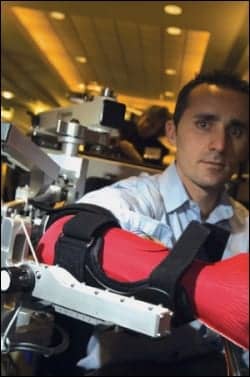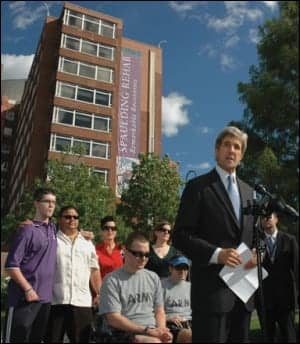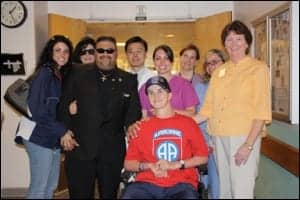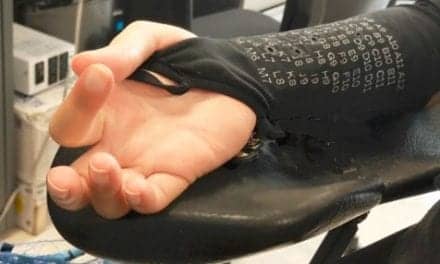Leveraging research-based innovation, clinical excellence, and a commitment to quality, Spaulding Rehabilitation Network continues to be at the forefront of post-acute care.

As serious health care reform on the federal level takes shape, organizations are looking at the ways they do business in a new light. The idea of better utilization of the entire health care continuum, specifically a new focus on post-acute care, is receiving increased attention for its value to both providers and consumers.
The Spaulding Rehabilitation Network, based in Boston, is one of the organizations nationally that is combining world-class care with integrating research, all while looking at opportunities to increase efficiencies in care delivery. Beginning in the fall of 2008 with the forming of the network, which combined several regional-area, post-acute facilities with the renowned care and expertise of Spaulding Rehabilitation Hospital, a constant review and sharing of best practices has occurred.
“As anyone in the health care field knows, this is a great time of change, but also exciting opportunities,” says Ulrike Berzau, vice president of therapy services. “Since creating the network, I feel that our therapists have been able to dramatically increase their skill sets by working not only on some of our various IRF facility programs such as Stroke and Spinal Cord Injury, but within the varied settings of long-term acute care and outpatient therapy.”
THE SPAULDING NETWORK OVERVIEW
- The Network offers 254 inpatient rehabilitation facility beds, 120 long-term acute care beds, and 331 skilled nursing facility beds.
- 23 outpatient rehabilitation centers located throughout eastern Massachusetts.
- Spaulding is the only rehabilitation hospital in New England listed in US News and World Report’s Best Hospitals since 1995, ranking #4 in 2010, its highest rank ever.
- Outcomes are consistently better than those of regional and national competitors, based on UDS FIM measures.
- Programs are Joint Commission- and CARF-accredited.
- Skilled nursing facilities have received AHCA/NCAL Quality Awards.
- Spaulding is the official teaching hospital of Harvard Medical School’s Department of Physical Medicine and Rehabilitation.
- Spaulding is the official rehabilitation hospital of the New England Patriots.
- Spaulding Network physicians are conducting more than 100 active research studies.
NETWORK CAPABILITIES

Armeo enables users with hand or arm deficits to replicate daily living tasks.
- Comprehensive rehabilitation programs designed to achieve the highest outcomes.
- Complex medical management with progressive rehabilitation services.
- Nationally recognized Centers of Excellence in brain injury and spinal cord injury.
- Variety of specialty programs at all levels of care such as stroke, orthopedics, neurology, cardiac, complex medical, ventilator, and pulmonary rehabilitation.
- Short-term rehabilitation, skilled nursing, and long-term care services.
- Extensive Outpatient Center services with specialties in sports injuries, spine care, musculoskeletal and neurological rehab, and a variety of other services.
- A member of Partners HealthCare, with clinical affiliations and access to the services of US News and World Report Honor Roll members Massachusetts General Hospital and Brigham and Women’s Hospital.
- Numerous specialty rehabilitation services, including brace and wheelchair clinics, functional living apartment, and patient/family education programs.
- Dedicated 15-bed pediatric rehabilitation program.
- Use of the latest technologies to improve function, including NESS L300, LiteGait, Lokomat, and assistive communication systems.
- Community outreach and support programs, including an adaptive sports and recreation program.
The Spaulding Rehabilitation Network consists of its flagship facility, Spaulding Rehabilitation Hospital in Boston; another IRF, Rehabilitation Hospital of the Cape and Islands; two long-term care hospitals, Shaughnessy-Kaplan Rehabilitation Hospital in Salem, Mass, and Spaulding Hospital Cambridge; as well as three Boston-area skilled nursing facilities. In addition, Spaulding has 23 outpatient centers through eastern Massachusetts. As a member of the Partners HealthCare System, Spaulding Rehabilitation Network physicians work closely with their colleagues from other member institutions such as Massachusetts General Hospital and Brigham and Women’s Hospital.
USING A TEAM APPROACH
At the core of everything done at Spaulding is its commitment to an integrated, multidisciplinary team. Every patient is assigned a unique physician-led team that can include physical, occupational, and speech therapy; case management; a social worker; and nursing. Each aspect of the patient’s therapy plan is coordinated and constantly evaluated to ensure the patient has the chance to achieve their optimal level of function.
“Each member of the team brings their unique expertise and clinical knowledge, which ensures the patient and family are getting the best possible care,” says Berzau. “We constantly push our best practices and look for every opportunity to create novel and effective approaches for the myriad of complex patient populations we treat. Because of our resources as a network, we can also coordinate across facilities from inpatient rehabilitation, to a skilled nursing center, to transition to outpatient therapy, ensuring continuity of care.”
The admission team works directly with the referring acute care hospital to ensure a smooth transition process for the patient and family. The outpatient centers also work closely with referring physicians to ensure a smooth process for patients to be approved for treatment. Maximizing these types of efficiencies is why organizations such as CARF International have recognized various network members for their effective approach to creating value-driven patient care.
INTERNATIONALLY RECOGNIZED RESEARCH PROGRAMS

Senator John Kerry with Spaulding leadership and wounded veterans announcing the historic TBI/PTSD study, September 2008.
The Spaulding Rehabilitation Network’s physicians are led by the chair of the Harvard Medical School’s Department of Physical Medicine and Rehabilitation, Ross Zafonte, DO. Under Dr Zafonte’s leadership, Spaulding has embarked on an ambitious research agenda that has further enhanced its standing as a national leader in recovery research.
“Spaulding’s unique position as a center of teaching and research allows us to truly become a place for the convergence of science and care,” says Zafonte. “By constantly pushing our current understanding with novel research and innovative approaches, we can truly, as a multidisciplinary team, begin to uncover the biology of recovery and significantly improve the outcomes for our patients.”
For example, the Motion Analysis Lab of Paolo Bonato, PhD, has collaborated with partners such as MIT and Hokoma (creators of the Lokomat) to develop technologies that represent the next wave of innovations in rehabilitation therapy. Projects like the Armeo, an exciting technology that utilizes “smart fabric” to provide a combination of biofeedback and on-screen virtual therapy, enables users with hand or arm deficits to replicate daily living tasks such as shopping or house cleaning. This approach provides both musculoskeletal and neurological stimulation so patients have increased therapy results in a shorter amount of time.
Spaulding’s Muscle Cell Physiology Laboratory, led by Jeffrey Widrick, PhD, has been internationally recognized for its innovative research methods. The lab has pioneered a unique approach to analyzing single muscle fibers to determine the effects of disease processes and treatments on the ability of muscle cells to generate force, velocity, and power. Current studies have produced findings that suggest new treatment methods for muscle weakness due to neuromuscular disease.
In addition to his dynamic leadership, Dr Zafonte’s recent work has made history, not just for the Spaulding Network but also for the nation. Sen John Kerry (D-Mass) joined Dr Zafonte at Spaulding’s main campus in Boston to announce a historic 5-year, $3-million grant as part of a nationwide clinical consortium from the Department of Defense.
The consortium was formed to conduct a long-term study on the effects of traumatic brain injury (TBI) and posttraumatic stress disorder. Spaulding is one of only 10 sites nationwide participating in this study and is the only rehabilitation hospital in the country so honored.
This grant is an extension of the important partnership Spaulding and fellow Partners HealthCare members Massachusetts General and Brigham and Women’s Hospitals, as well as the VA Boston, have built with the Department of Defense and the United States military to create the best care possible for our returning wounded soldiers.
The nine other participating centers are based at academic, Veterans Affairs, and military centers at Dartmouth College; Duke University; Madigan Army Medical Center; Uniformed Services University of the Health Sciences; Medical University of South Carolina/University of South Carolina; University of California, San Diego; University of Cincinnati; University of Maryland; and University of Washington.
“Spaulding Hospital is a world-class rehabilitation facility with a proven track record of working miracles with veterans suffering from TBI and other serious injuries,” says Senator Kerry. “I’ve seen the results firsthand and am incredibly impressed by the skill, dedication, and compassion shown by the doctors, nurses, administrators, and staff of Spaulding. This funding is a first step in ensuring that every American who serves their country receives the medical care they deserve.”
PRECEDENT-SETTING CARE

Vincent Mannion and family with his Spaulding Care team.
Spaulding Rehabilitation Hospital has also been honored as one of only a handful of private hospitals nationwide authorized by the US military to treat returning soldiers injured in Iraq and Afghanistan. Spaulding was the first hospital in New England to successfully discharge a soldier and has since seen several more cases. Spaulding clinicians and case managers have also begun knowledge-sharing programs to support the military as it expands the services available to all veterans.
The groundbreaking first case involved Cpl Vincent Mannion, who was 19 years old when he went to Iraq with the 82nd Airborne. In March 2007, Mannion was just three and a half weeks into a tour when, on patrol with his unit, a house loaded with explosives collapsed on top of him. The blast caused a severe traumatic brain injury, often called the war’s “signature injury.” Mannion also had two major blood clots in his brain, shrapnel lodged in his chest, and a badly damaged arm. Through a series of surgeries at Bethesda Naval Hospital and Walter Reed Hospital, doctors were able to repair some of the physical trauma.
Mannion’s parents, Jeff and Maura Brodeur, had been petitioning for Vincent to have his rehabilitation closer to home due to the duration of the stay required for his treatment. Through careful collaboration between his family, the Department of Defense, and care managers at Spaulding Rehabilitation Hospital in Boston, eventually the Department gave approval and Mannion was the first New England soldier to get approval for private hospital care for severe TBI.
“From the damage of the TBI, multiple areas of his brain were shut down. Through innovative medication trials and multidisciplinary therapies, Vincent has been able to progress to the point of talking, dressing himself, and walking with a brace,” says the Spaulding Brain Injury Program’s Heechin Chae, MD. “The extent of his recovery is nothing short of remarkable.”
Mannion was discharged on May 27, 2008, with a special send-off ceremony by the Spaulding staff. As the first soldier treated for severe TBI by private care in New England, his case has been a model of success, which has allowed many other soldiers and families to follow in his path and created the opportunities for knowledge-sharing and collaboration that have benefited many more.
AT THE FOREFRONT OF POST-ACUTE CARE
Throughout the Spaulding Rehabilitation Network, there is a commitment to find new and better ways to provide rehabilitative care. From initiatives by management to optimize operating efficiencies to constantly examining the methods and techniques of patient care, a spirit of improvement and innovation permeates throughout the Network.
Combining the power of cutting-edge research of a Harvard Medical School teaching hospital with facilities possessing decades of award-winning care creates a unique spectrum of services available to patients. With clinical affiliations at some of the world’s most renowned acute care hospitals, the Spaulding Rehabilitation Network offers an unmatched continuum of care.
Through research-based innovation, clinical excellence, and a commitment to quality, the Spaulding Rehabilitation Network will continue to be at the forefront of post-acute care.
Timothy Sullivan is the director of communications for Partners Continuing Care & The Spaulding Rehabilitation Network, Boston. For more information or to tour any of the Spaulding Rehabilitation Network facilities, visit www.spauldingrehab.org





